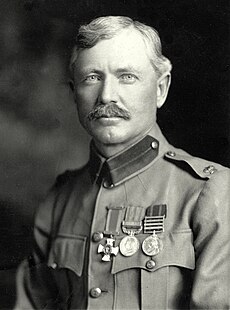Frederick Russell Burnham
| Frederick Russell Burnham | |
|---|---|

Major Burnham in his British Army uniform in 1901
|
|
| Nickname(s) |
|
| Born |
May 11, 1861 Tivoli, Minnesota (Sioux Indian territory; near Mankato, Minnesota) |
| Died | September 1, 1947 (aged 86) Santa Barbara, California |
| Buried at | Three Rivers, California (36°25′18″N 118°54′17″W / 36.42180°N 118.90470°WCoordinates: 36°25′18″N 118°54′17″W / 36.42180°N 118.90470°W) |
| Allegiance | U.S. citizen; scout for the United States Army, and for the British South Africa Company and British Army in southern Africa |
| Years of service |
|
| Rank | Major |
| Commands held | Chief of Scouts under Lord Roberts |
| Battles/wars | |
| Awards | |
| Spouse(s) |
|
| Relations |
|
| Other work | Messenger, Indian tracker, cowboy, gold miner, oil man, U.S. spy. Father of the international Scouting movement, Honorary President of the Roosevelt Council (Arizona) Boy Scouts of America |
Frederick Russell Burnham DSO (May 11, 1861 – September 1, 1947) was an American scout and world-traveling adventurer. He is known for his service to the British South Africa Company and to the British Army in colonial Africa, and for teaching woodcraft to Robert Baden-Powell in Rhodesia. He helped inspire the founding of the international Scouting Movement.
Burnham was born on a Lakota Sioux Indian reservation in Minnesota where he learned the ways of American Indians as a boy. By the age of 14, he was supporting himself in California, while also learning scouting from some of the last of the cowboys and frontiersmen of the American Southwest. Burnham had little formal education, never finishing high school. After moving to the Arizona Territory in the early 1880s, he was drawn into the Pleasant Valley War, a feud between families of ranchers and sheepherders. He escaped and later worked as a civilian tracker for the United States Army in the Apache Wars. Feeling the need for new adventures, Burnham took his family to southern Africa in 1893, seeing Cecil Rhodes's Cape to Cairo Railway project as the next undeveloped frontier.
Burnham distinguished himself in several battles in Rhodesia and South Africa and became Chief of Scouts. Despite his U.S. citizenship, his military title was British and his rank of major was formally given to him by King Edward VII. In special recognition of Burnham's heroism, the King invested him into the Companions of the Distinguished Service Order, giving Burnham the highest military honors earned by any American in the Second Boer War. He had become friends with Baden-Powell during the Second Matabele War in Rhodesia, teaching him outdoor skills and inspiring what would later become known as Scouting. Burnham returned to the United States, where he became involved in national defense efforts, business, oil, conservation, and the Boy Scouts of America (BSA).
...
Wikipedia
